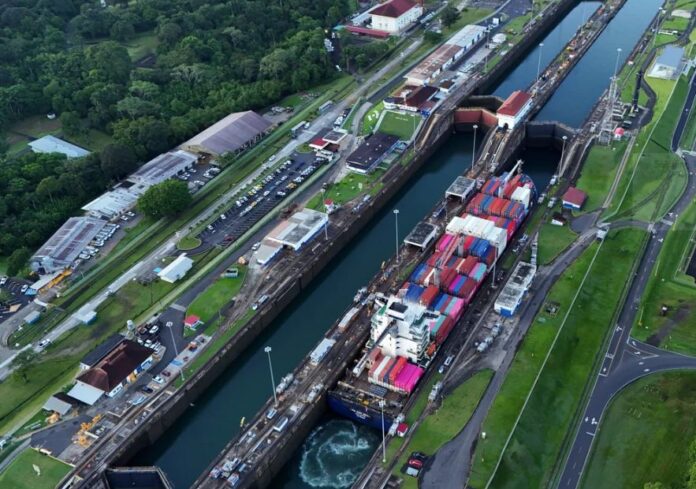Panama City, Panama – U.S. President Donald Trump reignited tensions in Panama this week with his assertion that the United States should regain control of the Panama Canal. His remarks stirred nationalist sentiment in the Central American nation, which has long been a symbol of resilience against foreign intervention.
“American ships are being severely overcharged and not treated fairly in any way, shape, or form, including the United States Navy. And above all, China is operating the Panama Canal,” Trump said on Monday, in comments that echoed earlier statements about reclaiming the vital trade route.
Panamanians took to the streets of the capital to express their discontent. For many, Trump’s remarks were seen as a ploy to pressure Panama into cooperating on U.S. priorities, such as tighter migration controls through the Darien Gap. Others viewed his rhetoric as reminiscent of the 1989 U.S. invasion of Panama, sparking concern over the possibility of history repeating itself.
President José Raúl Mulino dismissed Trump’s claims, stating emphatically, “The canal belongs to Panama. It is the pride of our people and will remain our territory.” His response comes amid celebrations marking the 25th anniversary of Panama’s full control of the canal, which was transferred on December 31, 1999, under a treaty signed by President Jimmy Carter in 1977.
A National Symbol of Sovereignty
For Panamanians, the canal is more than just a strategic waterway; it is a symbol of hard-fought sovereignty. Cab driver Luis Barrera, 52, reflected on the decades-long struggle to reclaim the canal. “We fought hard to get it back and have since expanded it. It’s like when someone big takes candy from a little kid,” he said, voicing the sentiment of many citizens.
At a rally in Phoenix last month, Trump criticized the handover of the canal, calling it a “foolish” decision and suggesting the U.S. might reclaim it, even hinting at the use of military force.
The comments sparked outrage in Panama, where an effigy of Trump was burned during protests commemorating the 1964 uprising against U.S. control. On January 9, 1964, Panamanian students clashed with U.S. forces over their right to fly the national flag in the canal zone, a conflict that resulted in the deaths of 21 Panamanians.
Clarifying China’s Role
Trump’s allegations about China’s control of the canal have also been challenged. Ricaurte Vásquez, the canal’s administrator, explained that Chinese companies operate ports at both ends of the canal as part of a Hong Kong consortium that won bids in 1997. Other ports are managed by U.S. and Taiwanese firms, and all nations are treated equally under a neutrality treaty.
“There is no truth to claims that China controls the Panama Canal,” Vásquez said.
Memories of U.S. Intervention
The specter of U.S. military intervention looms large in Panama’s collective memory. On December 20, 1989, the U.S. invaded Panama to oust dictator Manuel Noriega, deploying 27,000 troops. The operation, which left a lasting mark on the nation, was intended to protect U.S. citizens, capture Noriega, and restore democracy.
Omayra Avendaño, a real estate professional who was 11 during the invasion, expressed concern about Trump’s rhetoric. “We should be worried. We don’t have an army, and he’s said he would use force,” she said, urging the Panamanian government to seek international support to counter any potential threats.
For Panama, the canal remains a powerful symbol of independence, and any challenge to its sovereignty is bound to provoke strong reactions. As the country marks key anniversaries of both the canal handover and past struggles against foreign control, Trump’s remarks have only reignited a determination to protect what many see as a cornerstone of national identity.
Key Points:
- Trump’s Remarks on the Canal: U.S. President Donald Trump suggested that the U.S. should regain control of the Panama Canal, citing unfair charges on American ships and Chinese influence over the waterway.
- Nationalist Backlash in Panama: Panamanians, concerned about sovereignty, expressed discomfort with Trump’s comments, recalling the 1989 U.S. invasion and the struggle for canal control.
- Panamanian Government’s Response: President José Raúl Mulino firmly rejected Trump’s claims, emphasizing that the canal remains Panama’s territory.
- Historical Context: The Panama Canal was transferred from U.S. control to Panama on December 31, 1999, following the 1977 treaty. The canal is a source of national pride and historical significance for Panamanians.
- Trump’s Threat of Force: Trump previously suggested using military force to take back control of the canal, raising concerns about U.S. intervention.
- China’s Role: Trump’s accusations about China controlling the canal were refuted by Panama’s canal administrator, Ricaurte Vásquez, who clarified that Chinese companies operate ports but do not control the waterway.
- Public Sentiment: Many Panamanians, especially those who lived through the 1989 invasion, are apprehensive about potential U.S. military action. The public response has been one of caution and concern for the country’s sovereignty.



